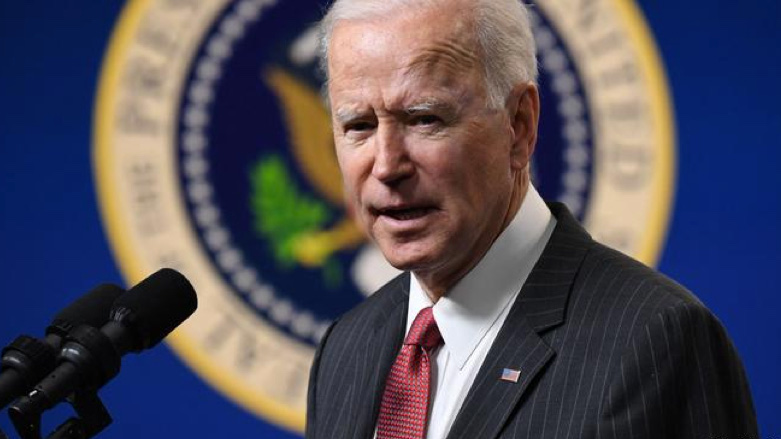Biden condemns Iranian regime’s suppression of protests; warns of more sanctions

WASHINGTON DC, United States (Kurdistan 24) – With protests in Iran—triggered by the death of a young Kurdish woman in the custody of Tehran’s morality police entering their third week—US President Joe Biden issued a statement on Monday condemning the regime’s repression of those protests.
The President’s statement marked the highest-level criticism to date of Iran from the Biden administration, which had come into office in Jan. 2021, hoping to restore the 2015 Iranian nuclear accord and otherwise reduce tensions with Tehran.
Biden’s statement indicated that the US would impose more sanctions on the Iranian regime—in addition to those imposed last month for its support of Russia in its aggression against Ukraine; Tehran’s malicious cyber activity, particularly ransomware attacks; and its repression of the popular protests.
Read More: US ‘sanctions IRGC-Affiliated Cyber Actors’ for Ransomware
Biden’s statement follows on that of Iran’s Supreme Leader earlier on Monday, when Ayatollah Ali Khamenei blamed the US and Israel for the widespread unrest.
“The recent riots & unrest in Iran” were “designed by the US; the usurping, fake Zionist regime; their mercenaries; & some treasonous Iranians abroad,” Khamenei tweeted.
I openly state that the recent riots & unrest in Iran were schemes designed by the US; the usurping, fake Zionist regime; their mercenaries; & some treasonous Iranians abroad who helped them.
— Khamenei.ir (@khamenei_ir) October 3, 2022
Biden’s Strong Criticism of Iran
Biden did not mention Khamenei’s charge in his own remarks. Rather, he focused on two issues: the repressive nature of the Iranian regime and US actions to support free speech in Iran.
“I remain gravely concerned about reports of the intensifying violent crackdown on peaceful protestors in Iran, including students and women, who are demanding their equal rights and basic human dignity,” Biden said in a written statement.
“For decades, Iran’s regime has denied fundamental freedoms to its people and suppressed the aspirations of successive generations through intimidation, coercion, and violence,” he continued. “The United States stands with Iranian women and all the citizens of Iran who are inspiring the world with their bravery.”
Biden then cited the actions already taken by his administration to support the principle of free speech in Iran, including “facilitating greater access” to the internet, which the regime is trying to shut down. He also stated that the US is “holding accountable Iranian officials and entities, such as the Morality Police, that are responsible for employing violence to suppress civil society.”
Read More: US promotes internet services in Iran, as Raisi calls for tough response to protests
“This week,” Biden affirmed, the United States will be imposing further costs on perpetrators of violence against peaceful protestors,” as he concluded, “We will continue holding Iranian officials accountable and supporting the rights of Iranians to protest freely.”
Failure of Iranian Hostage Diplomacy?
On Saturday, the UN announced that the Iranian regime had agreed to allow an elderly, dual US-Iranian citizen permission to travel abroad for medical treatment.
Read More: US welcomes Iran lifting travel ban on ailing 85-year old dual citizen
The 85-year old man, Baquer Namazi, a former governor of Khuzistan province, returned to Iran in 2016. Namazi was led to believe he could rescue his son, Siamak, a businessman who had carelessly travelled to Iran, only to find himself imprisoned on trumped-up charges of espionage.
However, when the elderly Namazi arrived in Iran, he was unable to secure his son’s release. Instead, he, himself was imprisoned!
If Tehran thought allowing Namazi to travel and granting a temporary reprieve to Siamak, would change the character of its increasingly difficult relations with the US and Europe, Biden’s statement suggests it did not,
Biden’s remark came, as unrest escalated, along with the regime’s repression. Protests occurred in universities in nearly half a dozen cities on Monday, The Washington Post reported, including at “Tehran’s elite Sharif University of Technology,” which it described as “a highly selective academic institution often compared to the Massachusetts Institute of Technology.”
